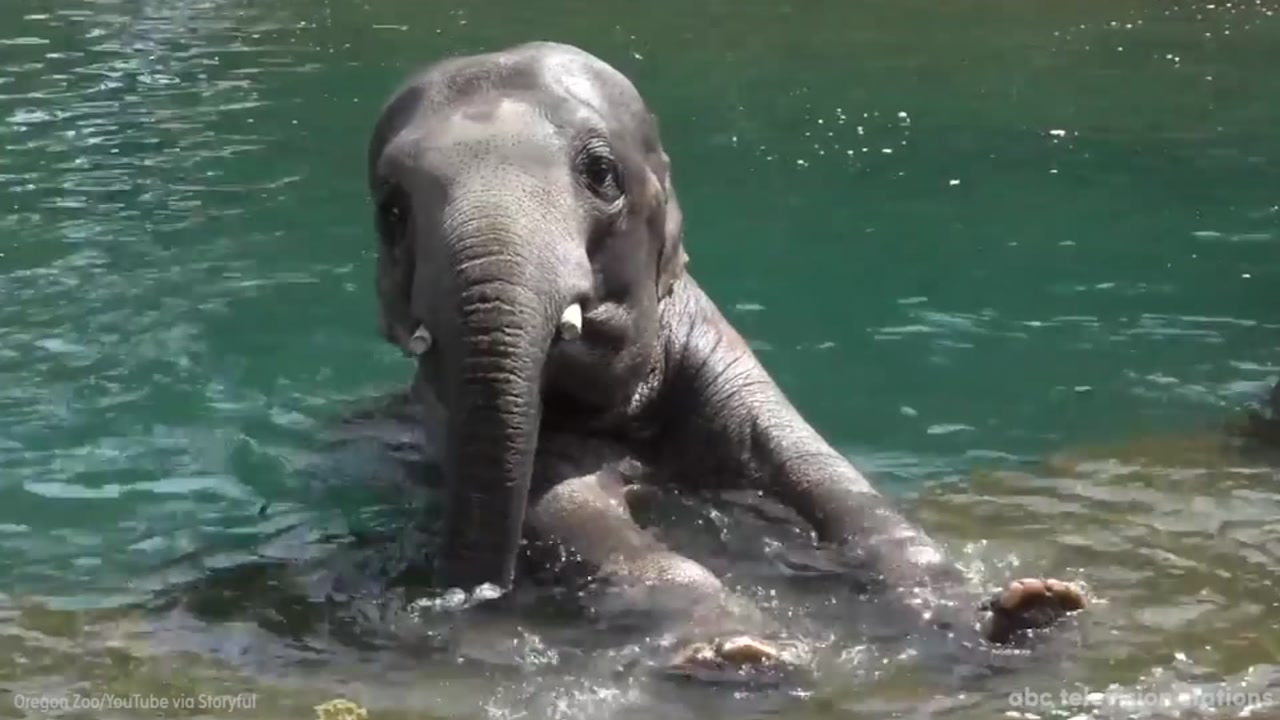
Imagine a serene afternoon by the pool, the sun shining brightly, and suddenly, an elephant walks in for a refreshing swim. This bizarre and whimsical scenario is not just a figment of our imagination; it has occurred in real life in various settings, reminding us of the unexpected moments that nature can bring. The idea of an elephant in a pool might evoke laughter, confusion, or even concern, but it certainly raises questions about the relationship between humans and wildlife.
The spectacle of an elephant in a pool can be both humorous and alarming. While elephants are known for their majestic presence and gentle demeanor, their unexpected foray into a swimming pool can create a myriad of reactions, from delight to disbelief. Whether it’s a private residence, a zoo, or a wildlife sanctuary, the sight of these magnificent creatures splashing around in water is sure to capture attention and spark conversations about animal behavior and habitat preservation.
As we explore this fascinating topic, we will delve into the reasons why elephants may find themselves in swimming pools, the implications of such encounters, and the broader context of wildlife conservation. From the playful antics of these colossal animals to the lessons we can learn about coexisting with nature, the phenomenon of the elephant in a pool is a remarkable story that deserves our attention.
What Leads an Elephant to a Swimming Pool?
Elephants are known to be naturally curious and intelligent creatures. Their behavior often reflects their need for social interaction, mental stimulation, and physical activity. Here are a few reasons why an elephant might end up in a pool:
- Curiosity: Elephants are highly inquisitive animals. A swimming pool can be an intriguing sight for them, prompting exploration.
- Heat Relief: Elephants have a thick skin that can get quite warm under the sun. A pool offers a cool respite from the heat.
- Playfulness: Elephants are known for their playful nature, and a pool can serve as a perfect playground for them.
- Social Interaction: When in groups, elephants often engage in playful behavior, and a pool can enhance their social bonds.
What Are the Dangers of an Elephant in a Pool?
While the idea of an elephant in a pool can be amusing, there are serious concerns associated with such encounters:
- Injury Risks: Elephants are large animals, and their presence in confined spaces can lead to accidents and injuries.
- Water Quality: Pools are not designed for wildlife, and the chemicals used can be harmful to elephants.
- Stress and Displacement: Being in an unnatural environment can cause stress for the elephant, impacting their health and behavior.
How Do Zoos Handle Elephants and Pools?
In many accredited zoos, the welfare of elephants is a top priority. Here’s how they manage pool access:
- Naturalistic Enclosures: Zoos often design enclosures that mimic natural habitats, including water features where elephants can bathe safely.
- Supervised Interactions: Trained staff monitor the elephants during pool time to ensure their safety and well-being.
- Enrichment Activities: Pools may be part of a larger enrichment program that encourages natural behaviors.
What Can We Learn from Elephant Encounters in Pools?
The presence of an elephant in a pool can serve as a metaphor for understanding our relationship with nature:
- Coexistence: The need for wildlife and humans to share spaces sustainably is more pressing than ever.
- Awareness: Such encounters can raise awareness about wildlife conservation and the challenges faced by elephants in their natural habitats.
- Empathy: Understanding the needs of wildlife can promote empathy and encourage proactive conservation efforts.
Can Elephants Swim?
Yes, elephants are natural swimmers! They have the ability to swim long distances using their trunk as a snorkel. In the wild, they often enjoy swimming in rivers and lakes, which helps cool them down and provides exercise. So, when you see an elephant in a pool, it’s not just a random event; it’s a behavior that showcases their adaptability and love for water.
What Are Some Famous Elephant Pool Incidents?
Throughout history, there have been numerous instances of elephants making headlines due to their unexpected pool ventures. Some notable incidents include:
- Elephants at Wildlife Sanctuaries: Many sanctuaries have shared videos of elephants enjoying their time in designated swimming areas.
- Zoo Exhibits: Several zoos have featured elephants engaging with water features as part of their daily routines.
- Viral Videos: Social media has played a significant role in sharing delightful clips of elephants playing in pools, garnering millions of views.
What Are the Conservation Implications?
The phenomenon of elephants in pools serves as a reminder of the importance of wildlife conservation. As human activities encroach upon natural habitats, it is vital to create safe spaces for these majestic creatures. Conservation efforts must focus on:
- Habitat Preservation: Protecting natural habitats to ensure elephants can thrive in their environments.
- Community Awareness: Educating communities about the significance of wildlife and promoting coexistence.
- Sustainable Practices: Encouraging sustainable practices that minimize environmental impact and support wildlife populations.
Conclusion: The Elephant in the Pool as a Symbol of Nature’s Wonders
The image of an elephant in a pool is more than just a whimsical scenario; it symbolizes the intricate relationship between humans and wildlife. While these encounters can be entertaining, they also serve as critical reminders of the challenges faced by elephants and other wildlife in a rapidly changing world. By understanding and respecting these magnificent creatures, we can work towards a future where humans and elephants coexist harmoniously, ensuring that future generations can also appreciate the beauty and wonder of nature.
ncG1vNJzZmivp6x7rK3PrKqnZpOkunCyzqyrnqpdorKiusinnp%2BtnGKwsLrNnpqtoZ%2BjwHCxy56noZmeqXqquoyppqikXp3Brrg%3D
